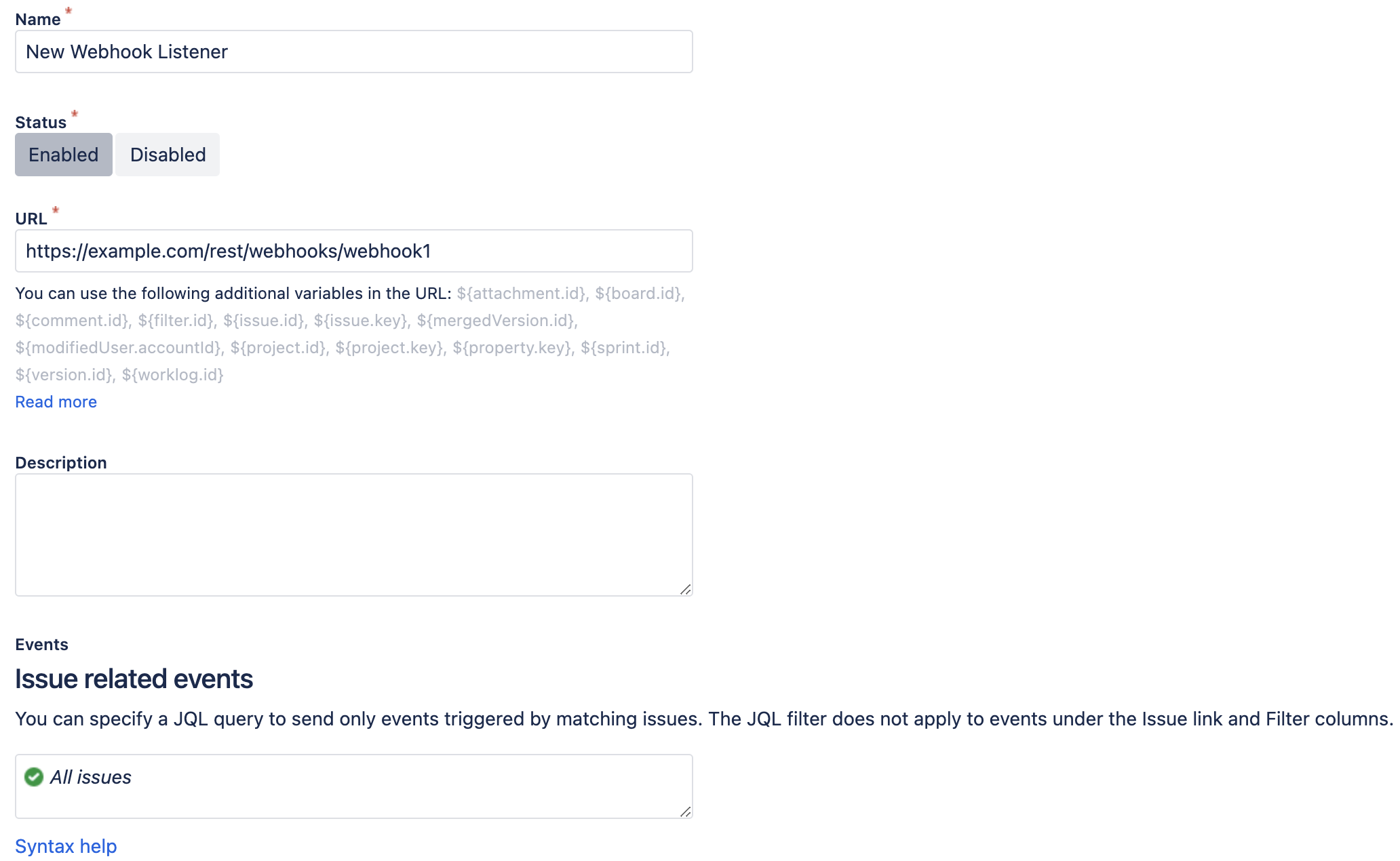- 28 May 2025
- 8 Minutes to read
- Print
- DarkLight
Atlassian
- Updated on 28 May 2025
- 8 Minutes to read
- Print
- DarkLight
Atlassian makes a suite of products that help foster enterprise work management, IT service management, and Agile development. Atlassian's products include:
Bitbucket
Confluence
Jira Work Management (this includes a suite of products, include Jira Software, Service Management, and Product Discovery)
Opsgenie
Trello
Atlassian has extensive documentation for both their Cloud and Data Center/Server editions.
Currently, LimaCharlie supports ingestion of Jira events. Jira events can be ingested in LimaCharlie via a json webhook Adapter.
Adapter Deployment
Jira events are ingested via a cloud-to-cloud webhook Adapter, configured to receive JSON events. In the creation of the Adapter, we map fields directly to the expected Atlassian events. The steps of creating this Adapter and enabling the input include:
Creating the webhook Adapter via the LimaCharlie CLI.
Discovering the URL created for the webhook Adapter.
Providing the completed URL to Jira for webhook events.
1. Creating the LimaCharlie Webhook Adapter
The following steps are modified from the generic webhook adapter creation documentation, found here.
Creating a Webhook Adapter requires a set of parameters, including organization ID, Installation Key, platform, and mapping details. The following configuration has been provided to configure a webhook Adapter for ingesting Jira events:
{
"sensor_type": "webhook",
"webhook": {
"secret": "atlassian-jira-secret",
"client_options": {
"hostname": "atlassian-jira",
"identity": {
"oid": "<your_oid>",
"installation_key": "<your_installation_key>"
},
"platform": "json",
"sensor_seed_key": "atlassian-jira-super-secret-key",
"mapping" : {
"event_type_path" : "webhookEvent",
"event_time_path" : "timestamp"
}
}
}
}
The mapping above is based on the expected webhook event from Jira. Note that in the mapping above, we make the following change:
event_type_pathis mapped to thewebhookEventfieldevent_time_pathis mapped to thetimestampfield
2. Building the Webhook URL
After creating the webhook, you'll need to retrieve the webhook URL from the Get Org URLs API call. You'll need the following information to complete the Webhook URL:
Organization ID
Webhook name (from the config)
Secret (from the config)
Let's assume the returned domain looks like 9157798c50af372c.hook.limacharlie.io, the format of the URL would be:
https://9157798c50af372c.hook.limacharlie.io/OID/HOOKNAME/SECRET
Note that the secret value can be provided in the webhook URL or as an HTTP header named lc-secret.
3. Providing the URL to Jira for Webhook Events
Within the Atlassian Admin window, navigate to Jira Administration > Jira settings > Advanced > WebHooks. Select + Create a WebHook.

Choose an appropriate name to differentiate that this is a LimaCharlie webhook
Provide the webhook URL (see step 2 above)
(optional) Provide a description
(optional) Provide a JQL query to select certain issues that will trigger Webhooks. The default selection is All issues.
Within the WebHook creation dialog, you can also select the granularity of events to send via the WebHook. High-level event categories include:
Issues
Issue events
Worklog
Comment(s)
Entity Properties
Attachment
Issue Link
Filter
User-related
Jira configuration
Project-related
Jira Software-related
By default, issues will be sent as JSON, which is natively accepted by LimaCharlie. Save your WebHook configuration, and perform an action that you know will trigger the event.
If configured properly, you should see your Jira events in LimaCharlie. Here's an example event:
{
"event": {
"issue": {
"fields": {
"aggregateprogress": {
"progress": 0,
"total": 0
},
"aggregatetimeestimate": null,
"aggregatetimeoriginalestimate": null,
"aggregatetimespent": null,
"assignee": null,
"attachment": [],
"comment": {
"comments": [],
"maxResults": 0,
"self": "https://###.atlassian.net...",
"startAt": 0,
"total": 0
},
"components": [],
"created": "2023-12-02T11:16:02.927-0600",
"creator": {
"accountId": "...",
"accountType": "atlassian",
"active": true,
"avatarUrls": {
"16x16": "...",
"24x24": "...",
"32x32": "...",
"48x48": "..."
},
"displayName": "Matt Bromiley",
"self": "https://###.atlassian.net...",
"timeZone": "America/Chicago"
},
"customfield_10001": null,
"customfield_10002": null,
"customfield_10003": null,
"customfield_10004": null,
"customfield_10005": null,
"customfield_10006": null,
"customfield_10007": null,
"customfield_10008": null,
"customfield_10009": null,
"customfield_10010": null,
"customfield_10014": null,
"customfield_10015": null,
"customfield_10016": null,
"customfield_10017": null,
"customfield_10018": {
"hasEpicLinkFieldDependency": false,
"nonEditableReason": {
"message": "The Parent Link is only available to Jira Premium users.",
"reason": "PLUGIN_LICENSE_ERROR"
},
"showField": false
},
"customfield_10019": "0|hzzzzz:",
"customfield_10020": null,
"customfield_10021": null,
"customfield_10022": null,
"customfield_10023": null,
"customfield_10024": null,
"customfield_10025": null,
"customfield_10026": null,
"customfield_10027": null,
"customfield_10028": null,
"customfield_10029": null,
"customfield_10030": null,
"description": null,
"duedate": null,
"environment": null,
"fixVersions": [],
"issuelinks": [],
"issuerestriction": {
"issuerestrictions": {},
"shouldDisplay": true
},
"issuetype": {
"avatarId": 10318,
"description": "Tasks track small, distinct pieces of work.",
"entityId": "e44d856a-3c4b-4a5e-bc67-c3c93227fe18",
"hierarchyLevel": 0,
"iconUrl": "https://###.atlassian.net/rest/api/...",
"id": "10001",
"name": "Task",
"self": "https://###.atlassian.net/rest/api/...",
"subtask": false
},
"labels": [],
"lastViewed": "2023-12-02T17:18:42.192-0600",
"priority": {
"iconUrl": "https://###.atlassian.net/rest/api/...",
"id": "3",
"name": "Medium",
"self": "https://###.atlassian.net/rest/api/..."
},
"progress": {
"progress": 0,
"total": 0
},
"project": {
"avatarUrls": {
"16x16": "...",
"24x24": "...",
"32x32": "...",
"48x48": "..."
},
"id": "10000",
"key": "KAN",
"name": "My Kanban Project",
"projectTypeKey": "software",
"self": "https://###.atlassian.net/rest/api/...",
"simplified": true
},
"reporter": {
"accountId": "...",
"accountType": "atlassian",
"active": true,
"avatarUrls": {
"16x16": "...",
"24x24": "...",
"32x32": "...",
"48x48": "..."
},
"displayName": "Matt Bromiley",
"self": "...",
"timeZone": "America/Chicago"
},
"resolution": null,
"resolutiondate": null,
"security": null,
"status": {
"description": "",
"iconUrl": "https://###.atlassian.net/",
"id": "10000",
"name": "To Do",
"self": "https://###.atlassian.net/rest/api/...",
"statusCategory": {
"colorName": "blue-gray",
"id": 2,
"key": "new",
"name": "To Do",
"self": "https://###.atlassian.net/rest/api/..."
}
},
"statuscategorychangedate": "2023-12-02T11:16:03.211-0600",
"subtasks": [],
"summary": "sample issue",
"timeestimate": null,
"timeoriginalestimate": null,
"timespent": null,
"timetracking": {},
"updated": "2023-12-02T11:16:03.129-0600",
"versions": [],
"votes": {
"hasVoted": false,
"self": "https://###.atlassian.net/rest/api/...",
"votes": 0
},
"watches": {
"isWatching": true,
"self": "https://###.atlassian.net/rest/api/...",
"watchCount": 1
},
"worklog": {
"maxResults": 20,
"startAt": 0,
"total": 0,
"worklogs": []
},
"workratio": -1
},
"id": "10012",
"key": "KAN-13",
"self": "https://###.atlassian.net/rest/api/..."
},
"timestamp": 1701559124723,
"user": {
"accountId": "...",
"accountType": "atlassian",
"active": true,
"avatarUrls": {
"16x16": "...",
"24x24": "...",
"32x32": "...",
"48x48": "..."
},
"displayName": "Matt Bromiley",
"self": "...",
"timeZone": "America/Chicago"
},
"webhookEvent": "jira:issue_deleted"
},
"routing": {...},
"ts": "2023-12-02 23:18:44"
}
Note that the Jira "webhookEvent" becomes the event type, also represented in the LimaCharlie Adapter timeline.

